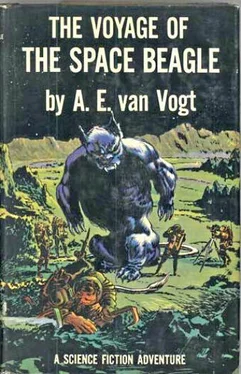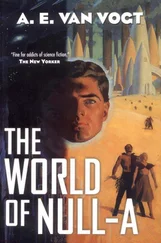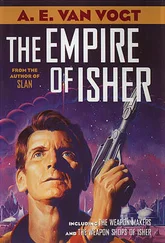“I’m waiting for reports!” Captain Leeth spoke stiffly.
Pennons said after a second’s silence, “The men are spread out over the three levels, according to plan. They’re taking continuous pictures with fluorite cameras. If he’s anywhere around, he’ll be seen. It will take at least thirty more minutes.”
Finally the report came. “Nothing!” Pennons’s tone reflected his dismay. “Commander, he must have got through safely.”
Somewhere a voice sounded plaintively on the momentarily open circuit of the communicators, “Now what are we going to do?”
It seemed to Grosvenor that the words probably expressed the doubt and anxiety of every person on the Space Beagle.
The silence grew long. The great men of the ship, who were ordinarily so articulate, seemed to have lost their voices. Grosvenor shrank a little from the purpose, the new plan, in his own mind. And then, slowly, he faced up to the reality that now confronted the expedition. But still he waited. For it was not up to him to speak first.
It was chief chemist Kent who finally broke the spell. “It would appear,” he said, “that our enemy can pass through energized walls as easily as through unenergized ones. We can continue to assume that he does not care for the experience, but that his recuperation is so swift that what he feels in one floor has no effect on him by the time he falls through the air to the next one.”
Captain Leeth said, “I should like to hear from Mr. Zeller. Where are you now, sir?”
“Zeller speaking!” The brisk voice of the metallurgist sounded on the communicators. “I’ve finished the resistance suit, Captain. And I’ve started my search at the bottom of the ship.”
“How long would it take to build resistance suits for every-body on the ship?”
Zeller’s reply was slow in coming. “We’d have to set up a production unit,” he said finally. “First we’d have to make the tools to make the tools that would make such suits in quantity from any metal. Simultaneously, we would start one of the hot piles to the task of making resistance metal. As you probably know, it comes out radioactive with a half life of five hours, which is a long time. My guess is that the first suit would roll off the assembly line in about two hundred hours from now.”
To Grosvenor, it sounded like a conservative estimate. The difficulty of machining resistance metal could hardly be overstated. Captain Leeth seemed to have been struck into silence by the metallurgist’s words. It was Smith who spoke.
“Then that’s out!” The biologist sounded uncertain. “And since the complete energization would also take too long, we’ve shot our bolt. We’ve got nothing else.”
The usually lazy voice of Gourlay, the communications expert, snapped, “I don’t see why those ways are out. We’re still alive. I suggest we get to work, and do as much as we can as soon as we can.”
“What makes you think,” Smith asked coldly, “that the creature is not capable of smashing down resistance metal? As a superior being, his knowledge of physics probably transcends our own. He might find it comparatively simple to construct a beam that could destroy anything we have. Don’t forget, pussy could pulverize resistance metal. And heaven knows there are plenty of tools available in the various laboratories.”
Gourlay said scornfully, “Are you suggesting that we give up?”
“No!” The biologist was angry. “I want us to use common sense. Let’s not just work blindly towards an unrealizable goal.”
Korita’s voice sounded on the communicators, and ended the verbal duel. “I am inclined to agree with Smith. I say further that we are now dealing with a being who must shortly realize that he cannot allow us time for anything important. For that and other reasons, I believe the creature would interfere if we attempted to prepare the ship for complete controlled energization.”
Captain Leeth remained silent. From the engine room, Kent’s voice came again. “What do you think he will do when he begins to understand that it’s dangerous to let us continue organizing against him?”
“He’ll start to kill. I can’t think of any method by which we can stop him, short of retreating into the engine room. And I believe, with Smith, that he will be able to come in there after us, given time.”
“Have you any suggestions?” That was Captain Leeth, Korita hesitated. “Frankly, no. I would say we mustn’t forget we are dealing with a creature who seems to be in the peasant stage of his particular cycle. To a peasant, his land and his son — or, to use a higher level of abstraction — his property and his blood are sacred. He fights blindly against encroachment. Like a plant, he attaches himself to a piece of property, and there he sinks his roots and nourishes his blood.”
Korita hesitated, then said, “That is the generalized picture, gentlemen. At the moment, I have no idea how it should be applied.”
Captain Leeth said, “I seriously can’t see how it can help us. Will each department head consult on his private band with his lower-echelon executives? Report in five minutes if anybody has come up with a worth-while idea?”
Grosvenor, who had no assistants in his department, said, “I wonder if I could ask Mr. Korita a few questions while the departmental discussions are in progress.”
Captain Leeth shook his head. “If no one else objects, you have my permission.”
There were no objections, so Grosvenor said, “Mr. Korita, are you available?”
“Who is this?”
“Grosvenor.”
“Oh, yes, Mr. Grosvenor. I recognize your voice now. Proceed.”
“You mentioned that the peasant clings with an almost senseless tenacity to his plot of land. If this creature is in the peasant stage of one of his civilizations, could he imagine our feeling differently about our property?”
“I’m sure he could not.”
“He would make his plans in the full conviction that we cannot escape him, since we are cornered aboard this ship?”
“It is a fairly safe assumption on his part. We cannot abandon the ship and survive.”
Grosvenor persisted, “But we are in a cycle where any particular property means little to us? We are not blindly attached to it?”
“I still don’t think I understand what you mean.” Korita sounded puzzled.
“I am,” said Grosvenor steadily, “pursuing your notion to its logical conclusion in this situation.”
Captain Leeth interrupted. “Mr. Grosvenor, I think I am beginning to get the direction of your reasoning. Are you about to offer another plan?”
“Yes.” In spite of himself, his voice trembled slightly.
Captain Leeth sounded taut. “Mr. Grosvenor,” he said, “if I’m anticipating you correctly, your solution shows courage and imagination. I want you to explain it to the others in—” he hesitated, and glanced at his watch — “as soon as the five minutes are up.”
After a very brief silence, Korita spoke again. “Mr. Grosvenor,” he said, “your reasoning is sound. We can make such a sacrifice without suffering a spiritual collapse. It is the only solution.”
A minute later, Grosvenor gave his analysis to the entire membership of the expeditionary force. When he finished, it was Smith who said in a tone that was scarcely more than a loud whisper, “Grosvenor, you’ve got it! It means sacrificing von Grossen and the others. It means individual sacrifice for every one of us. But you’re right. Property is not sacred to us. As for von Grossen and the four with him” — his voice grew stern and hard — “I haven’t had a chance to tell you about the notes I gave Morton. He didn’t tell you because I suggested a possible parallel with a certain species of wasp back home on Earth. The thought is so horrible that I think quick death will come as a release to those men.”
Читать дальше











